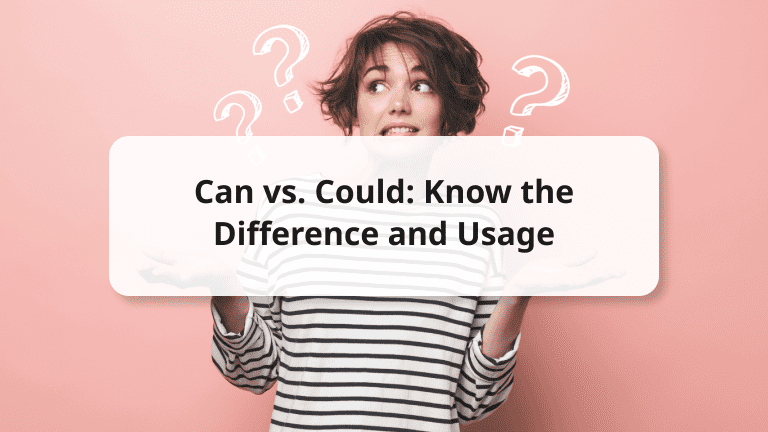Have you ever wondered “What is the difference between can vs. could?” Whether you are new to learning English or a native English speaker, English grammar can be both confusing and frustrating especially when they are words from the same verb, but mean two different things! However, the correct usage of grammar can bring clarity and confidence in your speech. Through this article and its easy guidelines, expand your mastery over the usage of can and could.
Table of Contents
ToggleCan vs. Could Comparison Chart
| Can (Modal Verb) | Could (Modal Verb) | |
| Meaning | – Able to; permitted to – Usually indicated a strong possibility | – Past tense of can – Usually indicated a weak possibility |
| Usage | – Used to indicate strong ability or possibility – Make requests – Informal use of asking for permission Refers to general truth | – Used to indicate weak possibility or past ability – Can also be used to make requests – Slightly more formal way to ask for permission – Could be used to indicate strong annoyance or inclination to do something – Used for giving advice or express hopeful desires |
| Examples | – I can swim. – Can I go home now? – Can I have this? | – They could be right. – I am so angry that I could scream. – I wish I could go home now, but it’s only 1 o’clock. |
The Primary Difference Between Can and Could
Though can and could are both modal verbs that have similar meaning, but they each indicate very different things in usage. We will explore more of what this means down below:
- Ability or Possibility 👍👎
- Can: Indicates strong present ability or strong possibility.
- You can park across the street.
- It can be dangerous to walk alone at night.
- Could: Indicates weak possibility and indicates something was possible in the past.
- I could try to make a cake but I have never done it before.
- You could have finished your homework yesterday.
- Can: Indicates strong present ability or strong possibility.
- Request 👏
- Can: Often used to make requests.
- Can you do this for me?
- Can I have your email and phone number?
- Could: Like ‘can’, could can be used to make requests.
- Could you do this for me?
- Could you wait for me?
- Can: Often used to make requests.
- Permission 🙋🏻♀️
- Can: Informal form of asking for permission.
- Can I go to the bathroom, please?
- Mom said, “You can go out and play with your friends.”
- Could: Slightly more formal form of asking for permission. Could can be used to in the past tense of asking for permission.
- Could I step out for a moment and make a call?
- I asked if could go somewhere for the weekend.
- Can: Informal form of asking for permission.
Special Considerations Between Can and Could
‘Could’ has many more additional usages such as conditional future scenarios, emphasizing strong emotion, or making suggestions. To get a more exhaustive explanation on all usage and examples of could and can follow this link to learn more.
Practice and Mastery: Can vs. Could
Now that you have learned all the primary differences between can and could, learning is not complete without practice. Let’s complete the practice below because diligent practice brings mastery!
Fill in the Blank:
- Monkeys ____ climb very well.
- ____ I ask you something? (informal)
- He asked if he ____ borrow my car tomorrow.
- Are you okay? Is there anything I ____ do to help you?
- When I was young I ____ play whenever I wanted.
- You ____ get that if you saved up some money.
- ____ you let me borrow some money?
- I don’t know how to speak Spanish that well, but I ____ understand what he said.
- My hand are full right now, ____ you help?
- I asked my boss if I ____ have the day off tomorrow.
Answer sheet – look after you are finished with the activity!
- Can
- Can
- Could
- Can
- Could
- Could
- Can/ Could
- Could
- Can/ Could
- Could
Practice Writing Prompt: Write a short personal story about the things you could or couldn’t do before COVID-19 pandemic versus now. The goal is to use can and could in your sentences.
If you find that you have hit a wall with your language learning journey, find an affordable and experienced tutor right at your fingertips🧑🏻💻 here at AmazingTalker.

Learning to speak English like a native is more than just learning proper grammar. Check out this article for 14 ways to learn American English online and speak like a native!
If you found this article useful and interesting, check out more articles from AmazingTalker that can expand your knowledge and aid you on your language learning journey:
















